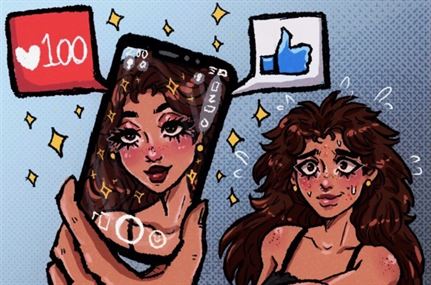Teenagers now have the ability to morph their faces due to the hundreds of filters provided to them on social media apps such as TikTok, Instagram and Snapchat.
These filters spark self-esteem issues among users through an emphasis on impossible beauty standards. Filters give people the ability to see what they “could look like” through a false lens of unrealistic standards.
Celebrities and social media influencers present their audience with a manufactured idea of beauty which can only be achieved by those who can afford it. With money, influencers can get extensive cosmetic surgery, expensive personal trainers and top-tier skincare. Those who are from a lower socioeconomic class do not have access to those same privileges.
Filters tend to recreate the expensive, cultivated appearances of the wealthy and powerful, neglecting to acknowledge that a large amount of their follower demographic consists of young women who are more than likely unable to afford the same luxuries. With the introduction of filters, young women can mimic these “influencer looks” by enlarging their lips or smoothing their skin.
It was only recently that large lips were made trendy. Before 2017, people of color were looked down upon and insulted for having large lips. It is now considered an aesthetic preference because of white influencers like Kylie Jenner and reality shows such as “Love Island.” The enlarged lip filter is problematic and promotes this appropriation as acceptable and even encouraged on social media.
Many of the filters we see suggest a look that aligns with the Western standard of beauty, which is rooted in layers of ageism, racism and fatphobia. Applying a filter and seeing your face be altered in a way that suggests your natural features can be considered “imperfections” has damaging effects on self-image. A number of the filters include a face thinning feature which can be triggering for those with eating disorders, as it insinuates skinny as the model facial type.
There is a notably popular filter on TikTok called the “inverted” filter which allows users to flip their faces from what they normally see in the mirrors to how they are viewed by others.
It can be shocking for someone to see that they are naturally asymmetrical. People have posted themselves hysterically crying as they rapidly flip their camera, noticing the asymmetry. It is detrimental to confidence and a horrible reflection of our society’s expectations.
Symmetry does not define beauty, nor does any other physical standard. But filters push for flawlessness even if it’s at the expense of young people, who yearn to look like the celebrities that flood their Instagram feeds.
As technology advances, these filters have progressed and become more sophisticated, intensifying already dramatic face-altering effects. One can’t help but feel the pressure to achieve these unattainable ideals. We feel compelled to keep the filter on for a “picture-perfect” photo.
Social media has provided a platform for creators to showcase their work, brought families closer together and has proven helpful during a global pandemic, but it has also given us a false sense of reality.
As we see people looking more like filters every day, it is impossible to ignore how platforms enable changing to fit society’s aesthetic standards. Filters encourage young people to alter themselves and teach them to value physical appearance over self-love.



